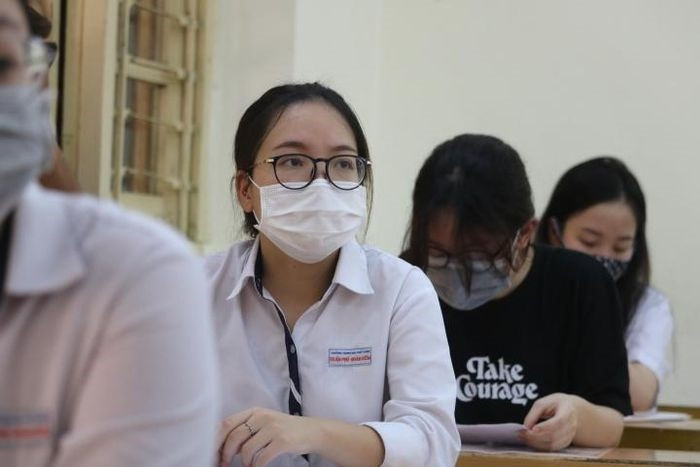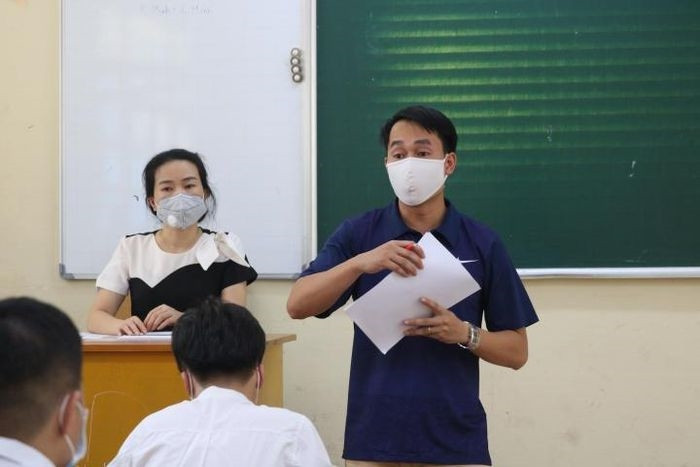Experts hope that the Ministry of Education and Training (MOET) will maintain regional priority points in the admission process, helping retakers increase their chances of entering university.
Tran Pham Hoang Bach (Son La) is currently a first-year student at a university in Hanoi. A year ago, Bach failed the Hanoi University of Pharmacy entrance exam because he was 0.25 points short. Therefore, this year he is determined to review and retake the high school graduation exam to get the score to be admitted to the university of his choice.
However, when looking at the draft 2022 enrollment regulations, the male student was disappointed because he would not receive 0.75 priority points for region 1.

Candidates taking the high school graduation exam
According to the draft announced by the Ministry of Education and Training, the regional priority points remain the same: candidates in region 1 will receive 0.75 points; rural region 2 will receive 0.5 points; and region 2 will receive 0.25 points. However, the draft stipulates that regional priority points will only be added to candidates graduating from high school this year.
This means that candidates who graduated from previous years (independent candidates) like Bach will not receive bonus points when retaking the exam to get university and college admission results. The old regulation allowed bonus points for candidates who graduated in previous years.
For Bach, in the race to get into a top university like Hanoi University of Pharmacy, 0.25 points is also very precious, it can decide whether to fail or pass. Bach understands the feeling of being on the verge of university but still failing due to a lack of 0.25 points. Not to mention, some majors last year required up to 30 points, the role of regional priority points is even more important.
"Without extra points, is it fair for me and many other students from poor mountainous areas whose learning conditions are not equal to those in urban areas?", Bach said.
The Ministry of Education and Training has adjusted the priority bonus points many times. Before 2003, candidates were given a maximum of 3 regional priority points. From 2004 to 2017, the maximum was 1.5 points. And from 2018, the highest regional priority point was 0.75.
Dr. Nguyen Trung Nhan, Head of Training Department, Ho Chi Minh City University of Industry, said that removing regional priority points for independent candidates can be applied in the admission method based on graduation exam scores or admission to separate exams, such as capacity assessment. With the method of considering academic records, according to him, the points should still be maintained. Because the academic records are closely affected by regional factors.
Dr. Le Viet Khuyen, Vice President of the Association of Vietnamese Universities and Colleges, also said that the regulation of giving priority points should be maintained for all candidates, whether they are taking the graduation exam this year or in previous years.

Exam invigilators disseminate high school graduation exam regulations
According to him, the priority points are intended to encourage and support candidates from rural areas, where learning conditions are more difficult than in urban areas. Priority points should only be removed when equality and fairness between regions and areas are ensured. In Vietnam, the benefits from social welfare are still uneven, so such priorities are still needed.
For independent candidates, even though they retake the exam, their circumstances remain unchanged, they still study in priority areas and suffer many disadvantages, why is there such discrimination and exclusion? Not to mention, many candidates have to work hard to make a living, because they do not have enough money to go to school, so they have to accept staying at home. After a while, when their lives improve, they have the opportunity to continue studying. These subjects should still be prioritized and encouraged, Dr. Khuyen emphasized.
Mr. Tran Khac Le, Director of the Phu Yen Department of Education and Training, said that the preferential bonus points should not be removed for candidates who retake the exam. Many students who could not take the exam last year due to the COVID-19 pandemic or their families' financial difficulties chose to work part-time to save money for school, waiting to retake the exam this year. If the preferential bonus points are removed, it means that they will lose part of their chance of being admitted to university.
On the other hand, the difference in qualifications among teachers is also a matter of concern. Good teachers tend to move to centers or famous schools, while teachers in rural and disadvantaged areas have few opportunities to improve their skills.
According to him, it is necessary to narrow down the subjects that receive bonus points, and give more priority to disadvantaged subjects and difficult areas.
Associate Professor Dr. Nguyen Thu Thuy, Director of the Department of Higher Education (Ministry of Education and Training) explained that this regulation aims to ensure fairness between two groups of candidates: 12th grade students preparing for graduation exams; and those who have graduated and are taking the exam for university admission.
According to Ms. Thuy, candidates who graduated in previous years have more advantages and time to review than those taking the exam for the first time.
"Many candidates, although their household registration is in a priority area, have moved to localities and cities with better conditions to review a few subjects for university admission. Meanwhile, candidates taking the exam for the first time have to review more subjects and are under more pressure to both take the graduation exam and take the university entrance exam," said Ms. Thuy.
According to VTC News